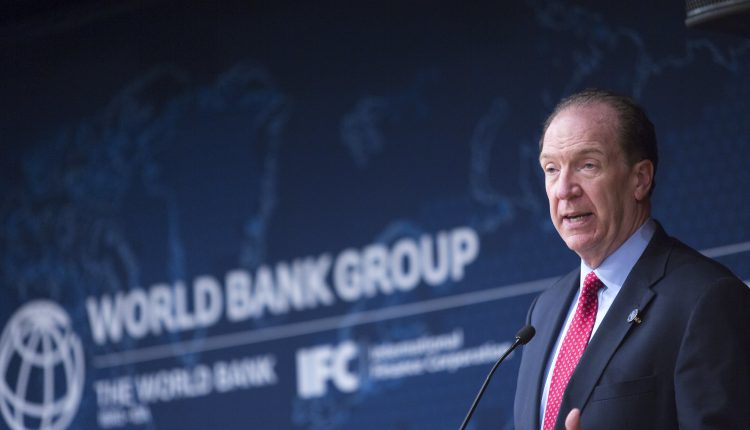World Bank president David Malpass to step down early
World Bank President David Malpass announced on Wednesday that he informed the board of his intention to resign by the end of the bank’s financing year on June 30 after serving more than four years.
During his tenure, Malpass focused on seeking stronger policies to increase economic growth, alleviate poverty, improve living standards, and reduce government debt burdens, a WB statement read.
“With developing countries facing unprecedented crises, I’m proud that the Bank Group has responded with speed, scale, innovation, and impact.” said Malpass.
Over the last four years, the bank’s five institutions; IBRD, IDA, IFC, MIGA, and ICSID responded proactively to global crises, mobilising a record $440 billion in response to the COVID-19 pandemic, war in Ukraine, sharp global economic slowdown, unsustainable debt burdens, climate change, and food, fertiliser, and energy shortages.
“Having made much progress, and after a good deal of thought, I’ve decided to pursue new challenges. I want to thank our staff and Boards of Directors for the privilege of working with them every day to strengthen the effectiveness of our operations in the most challenging of times.” he added.
With developing countries suffering from severe financial pressure, Malpass met frequently with world leaders to discuss supportive policies, including debt reduction to break the cycles of unsustainable debt.
Under his leadership, the Bank Group more than doubled its climate finance to developing countries, reaching a record $32 billion last year.
“This is an opportunity for a smooth leadership transition as the Bank Group works to meet increasing global challenges, facilitate private investment, sharpen its focus on global public goods, and maintain strong momentum on operational delivery and portfolio performance for client countries.”
According to the World Bank statement, the bank accomplished the following during Malpass’s tenure;
- Implemented record increases in financing of over $157 billion in response to the COVID-19 pandemic and $170 billion in response to the war in Ukraine.
- Completed IBRD and IFC capital hikes, record IDA19 and IDA20 replenishments, and rapid ramp-up of medium- and long-term bond issuance.
- Provided emergency health and vaccine operations in over 100 countries.
- Mobilised $18 billion in emergency financing for Ukraine to ensure the continuation of essential government services.
- Initiated a process with the World Bank’s shareholders to evolve the institution’s Vision and Mission, Operating Model, and Financial Capacity and Model to increase resources for development.
- Launched the bank’s Climate Change Action Plan to better integrate climate and biodiversity with development and growth.
- Made $30 billion available in projects to handle the food, fertiliser, and fuel crisis facing developing countries.
- Launched the Pandemic Fund to improve preparedness, with initial pledges worth $1.6 billion from 25 countries and donors.
- Raised financing and staffing for fragile and conflict-affected regions and for clean water, electricity access, and improved nutrition.
- Evolved the bank’s relationship with China by reducing lending and focusing on global public goods and marine plastic pollution reduction.
- Launched innovative financial instruments, for instance a joint bond issuance with UNICEF, wildlife conservation bonds, an Emission Reduction-Linked Bond in Vietnam, and a concessional financing trust fund to provide results-based support for emissions reduction.
Moreover, one of Malpass’s key initiatives was to promote debt transparency and sustainability, key to rebuilding investment and growth. Under his leadership, the World Bank;
- Launched the 2023 Global Sovereign Debt “Roundtable” process with the International Monetary Fund (IMF) to strengthen the debt restructuring process.
- Issued the timely “Global Waves of Debt” report in December 2019, which urged “debt management and transparency to be top priorities for policymakers—so they can increase growth and investment and ensure that the debt they take on contributes to better development outcomes for the people.”
- Cooperated with global leaders to break the cycles of unsustainable debt.
- Carried out the bank’s Sustainable Development Finance Policy (SDFP) to incentivise countries to move toward transparent, sustainable financing.
- Strengthened debt reconciliation and reporting, including central bank swap lines, in the bank’s database, International Debt Statistics (IDS).
Another key priority was to strengthen the effectiveness of Bank Group management. During his tenure, Malpass has:
- Made transparency of internal and external activities a priority, including through detailed financial and climate disclosures.
- Carried out an important realignment of World Bank operations to deepen collaboration and better integrate the Global Practices and Regional Operating units.
- Worked to ensure fiscal discipline, more trust fund cost recovery, and downsized the Bank Group’s real estate footprint.
- Made partnerships with the Presidents of six Historically Black Colleges and Universities (HBCUs) to promote the sharing of knowledge and talent among the institutions and developing countries.
- Accomplished double-digit improvement in Staff Engagement Surveys on working together, clarity of strategy, and progress toward a culture of openness and trust.
- Initiated the Sexual Harassment Working Group, Anti-Racism Task Force, and Task Force on Workplace Culture to help establish a better, more cohesive, collaborative, and responsive working environment.
- Navigated multiple threats to staff security, such as staff evacuations from Afghanistan, Myanmar, Sudan, Ukraine, and following coup d’états across the Sahel.


